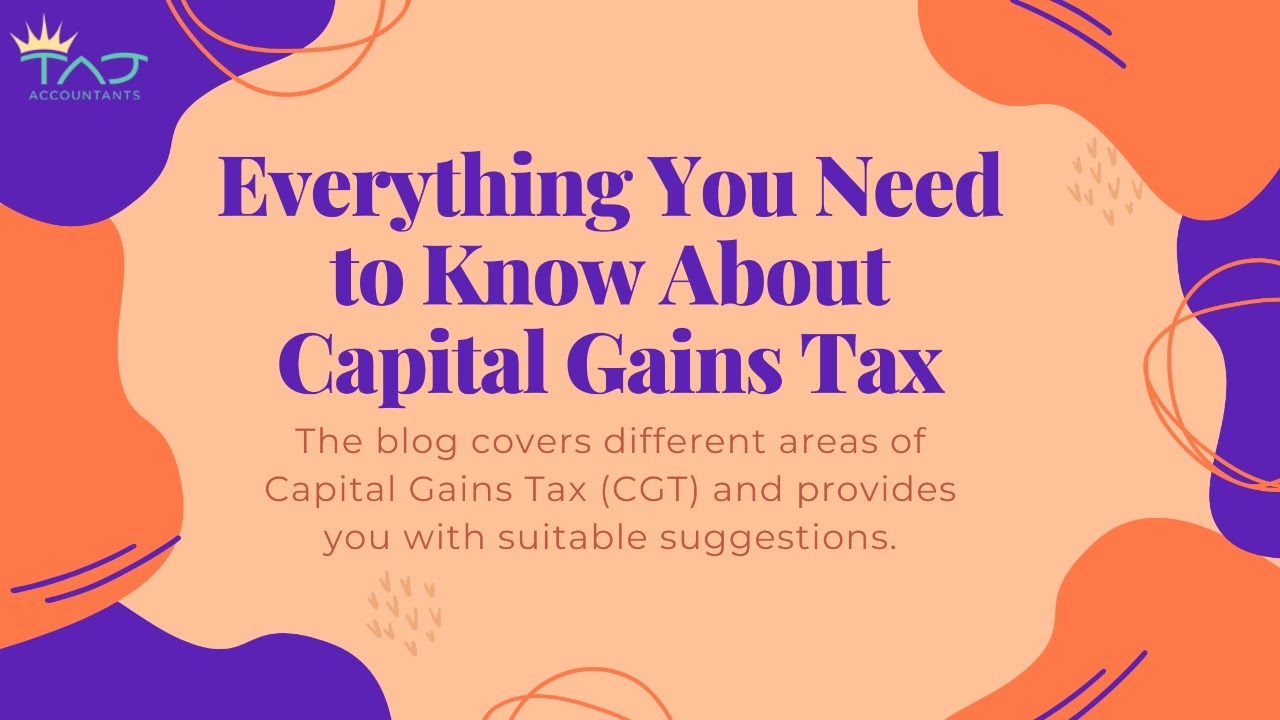Everything You Need to Know About Capital Gains Tax
The blog covers different areas of Capital Gains Tax (CGT) and provides you with suitable suggestions.
Taj Accountants, your accounts and taxation service provider in East London has come up with all the multi-dimensional perspectives on Capital Gains Tax (CGT). On our way to filing tax and providing consultancy regarding taxation, we have come across a lot of questions regarding Capital Gain Tax. So with a view to help the mass audience, we have come up with the following frequently asked questions for your business:
What Is Capital Gains Tax?
When you sell an asset such as a piece of land, shares of stock, bonds or a business and get a higher worth than the purchase price (profit), you obtain a capital gain. Profits from such assets are considered as taxable income and these taxes depend on the duration of your assets before disposal. The taxes that are imposed in such cases are known as Capital gain tax (CGT).
For the readers it’s important to know that it’s the gain that gets taxed from your business, not the whole amount of money you earn. For example, you bought an asset worth £10,000 and sold it later for £15,000. Here, you made a gain of £5,000 and you’ll be only taxed on that £5,000.
Is there any classification for Capital Gains Tax?
Capital gains are classified as either long-term or short-term and so are the taxes.
Short-term capital gains tax results from the sale of an asset held for one year or less. For short-term capital gains tax you will be taxed based on your ordinary income tax rate.
Long-term capital gains tax on the other hand is a tax on profits from the sale of an asset with a duration for more than a year. Long-term capital gains rate is generally lower than the short-term capital gain rate.
In what other cases do I need to pay CGT?
Capital Gains Tax would be imposed in cases such as receiving an asset as a gift. In this type of case, taxation is applicable and you need to run a valuation of the worth of the asset at disposal during the capital gain. You can however apply for tax relief through your local accountant.
Inherited assets will also get taxed on disposal. Thereby you need to know the worth and time of its inheritance for calculating and making necessary reports on any capital gain of your tax return.
You are bound to pay tax on the gains you make on properties and lands in the UK even if you’re a non-resident for tax purposes.
In what exception do I not need to pay CGT?
There are some exceptional assets that are tax-free and abide by some complex rules. For example, assets with a life expectancy under 50 years. You do not need to pay Capital Gains Tax on certain assets such as- ISAs or PEPs,betting, lottery winnings, UK government gilts and Premium Bonds. Gifts are taxable but you do not need to pay tax on gifts given by your spouse, civil partner or a charity.
Also, there are tax deductible capital gains based on your tax-free allowance. In case of total gains under an annual tax-free allowance, you do not need to pay CTG. Contact your accountants in London for obtaining such cases.
What are the Capital Gains Tax allowances?
The capital gain tax allowance refers to paying Capital Gains Tax on the Annual Exempt Amount. For the 2019/20 tax year the capital gain free allowance is £12,300 and £6,150 for trusts. You’ll need to report and pay Capital Gains Tax if your taxable gains are above your allowance. The tax year runs from 6 April to 5 April the following year.
Depending on your asset, you can also reduce your tax bill by deducting losses or claiming reliefs.
What are the Capital Gains Tax Rates?
Based on the total amount of your taxable income and your marginal rate of personal tax you are taxed. The rate of tax on gains varies more from residential property than it does on other assets. For the tax years 2020/21 and 2019/20 Capital Gains Tax rates are imposed as the following rates:
For individuals excluding residential property: 10% or 20%
For individuals including residential property and carried interest: 18% or 28% tax rates
For representatives of deceased/trustees excluding residential property: 20%
For representatives of deceased/trustees including disposals of residential property: 28%
For sole trader or partnership qualifying for Business Asset Disposal Relief: 10%
Learn more from the accountants in East London or Taj Accountants.
How can I report and pay Capital Gains Tax?
You need to pay the Capital Gains Tax on UK property service within 30 days of selling UK property if any of your gains are from UK property disposal after 6 April 2020. You can report and pay CGT using the ‘real time’ Capital Gains Tax service. You can also file a Self Assessment tax return to report your gains in the tax year after you have disposed of assets. If you have not already completed a Self Assessment you will need to register with HMRC by 5th October.
Before reporting, you need to calculate each capital gain or loss. You need to collect information from your records about the costs and profit. You also need to look for any other relevant details, such as any reliefs you’re entitled to. You can use the assistance of small business accountants in your area for the process.
What if I make a loss?
You cannot always get lucky with the disposal of an old asset. In some cases you may face a loss. In such cases you can report your allowable losses on a chargeable asset to HMRC in order to reduce your total taxable gains.
How can Taj Accountants help you?
Taj Accountants offers you accounts and taxation services with approved software by the HMRC and Companies House, ensuring total compliance with current regulations. You can get our services both online and offline at your convenience.
Our system is always up-to-date with the current Tax updates and the necessary amendments provided to our small businesses and individuals. We take every case with great care and ensure quality work at an affordable price. You can contact us any time and we’ll be happy to discuss your problems and provide you with the best possible solution.
DISCLAIMER: The purpose of the blog is to provide information and insight regarding the situation. The readers must contact experts before making any decisions based on the information. We highly appreciate you to contact Taj Accountants for further assistance.


